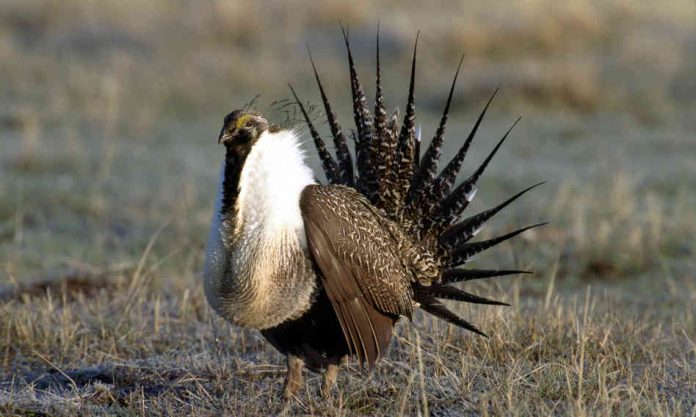
U.S. Secretary of the Interior Sally Jewell today released a comprehensive, science-based strategy to address the increasing threat of wildfires that are damaging vital sagebrush landscapes and productive rangelands in the West.
(The greater sage-grouse is the largest grouse in North America. Its range is sagebrush country in the western United States and southern Alberta and Saskatchewan, Canada.)
The Strategy details a more focused, coordinated and collaborative approach for rangeland fire management, particularly in the Great Basin region of Idaho, Utah, Nevada, Oregon and California.
The final report, An Integrated Rangeland Fire Management Strategy, focuses on reducing the size, severity and cost of rangeland fires, addressing the spread of cheatgrass and other invasive species that exacerbate the threat of fire, and positioning fire management resources for more effective rangeland fire response. Today’s long-term action plan builds upon an Initial Report, issued March 10, that detailed immediate actions Interior’s bureaus and partners are taking to address the threat of rangeland fire to sagebrush landscapes before and during the 2015 wildfire season.
“We now have a fully integrated Strategy among federal, state, tribal and community partners that provides a set of actions to take now and in the future to fight rangeland fires across the West,” said Secretary Jewell, who was joined by Idaho Governor C. L. “Butch” Otter and Jim Hubbard, U.S. Forest Service, Deputy Chief for State and Private Forestry at the U.S. Department of Agriculture, in making the announcement. “This roadmap takes a comprehensive and scientific approach to protect against some of the most intense wildfires that are damaging the American West’s productive rangelands and sagebrush landscapes.”
Jewell has been working closely with western leaders and federal and other partners to improve rangeland fire-fighting capacity at all levels and to encourage proactive partnerships with ranchers, farmers, rural communities and other landowners.
“Habitat degradation due to wildfire and invasive species is the primary threat to sage-grouse in Idaho,” Governor Otter said. “As you know, Rangeland Fire Protection Associations (RFPAs) are an integral part of Idaho’s sage-grouse conservation Strategy. They’ve already impacted the BLM’s ability to manage wildfire by reducing response times. In fact, several times during last year’s fire season, the BLM arrived just in time to help the RFPA crew clean up. Before creating RFPAs, these fires more than likely would have run out of control and burned a lot more habitat.”
“USDA Forest Service will work with our partners within the Department of Interior, as well as state, tribal and local firefighting organizations to support wildland fire management operations in sagebrush landscapes,” said Deputy Chief Jim Hubbard. “These cooperators are essential to ensuring that every wildfire receives an appropriate, risk informed, and effective response regardless of the jurisdiction.”
MORE HERE

